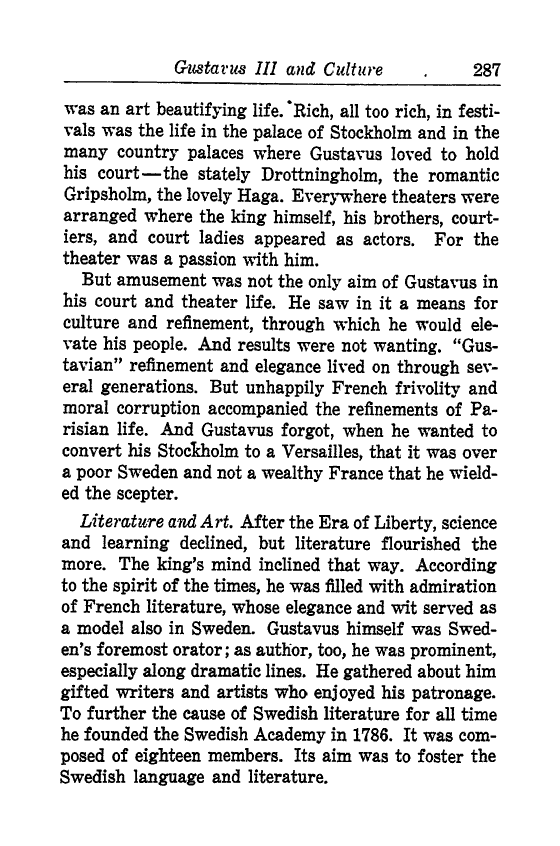
Full resolution (TIFF) - On this page / på denna sida - XVI. Reign of Gustavus III, 1771–1792 - D. Culture during the Period

<< prev. page << föreg. sida << >> nästa sida >> next page >>
Below is the raw OCR text
from the above scanned image.
Do you see an error? Proofread the page now!
Här nedan syns maskintolkade texten från faksimilbilden ovan.
Ser du något fel? Korrekturläs sidan nu!
This page has never been proofread. / Denna sida har aldrig korrekturlästs.
G-ustavus III and Culture . 287
was an art beautifying life. *Kich, all too rich, in festi-
vals was the life in the palace of Stockholm and in the
many country palaces where Gustavus loved to hold
his court the stately Drottningholm, the romantic
Gripsholm, the lovely Haga. Everywhere theaters were
arranged where the king himself, his brothers, court-
iers, and court ladies appeared as actors. For the
theater was a passion with him.
But amusement was not the only aim of Gustavus in
his court and theater life. He saw in it a means for
culture and refinement, through which he would ele-
vate his people. And results were not wanting. "Gus-
tavian" refinement and elegance lived on through sev-
eral generations. But unhappily French frivolity and
moral corruption accompanied the refinements of Pa-
risian life. And Gustavus forgot, when he wanted to
convert his Stockholm to a Versailles, that it was over
a poor Sweden and not a wealthy France that he wield-
ed the scepter.
Literature and Art. After the Era of Liberty, science
and learning declined, but literature flourished the
more. The king’s mind inclined that way. According
to the spirit of the times, he was filled with admiration
of French literature, whose elegance and wit served as
a model also in Sweden. Gustavus himself was Swed-
en’s foremost orator ; as author, too, he was prominent,
especially along dramatic lines. He gathered about him
gifted writers and artists who enjoyed his patronage.
To further the cause of Swedish literature for all time
he founded the Swedish Academy in 1786. It was com-
posed of eighteen members. Its aim was to foster the
Swedish language and literature.
<< prev. page << föreg. sida << >> nästa sida >> next page >>